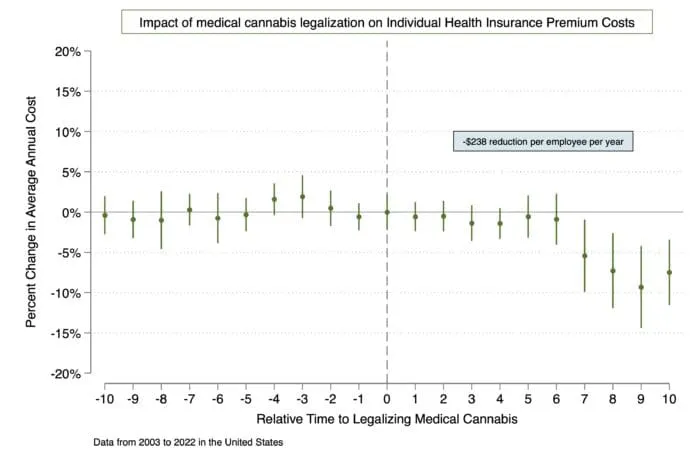A new study published in the journal Applied Health Economics and Health Policy reveals that companies in states with medical cannabis laws are seeing significant savings in employer-sponsored health insurance premiums.

The research, conducted by Leafwell, highlights the economic benefits of medical cannabis for businesses, potentially offering a new incentive for more states to adopt such laws.
According to the study, companies in states with medical cannabis laws pay 3.4% less in premiums for individual coverage plans compared to states without such laws. This translates to an average savings of $238 per employee annually. For employee-plus-one coverage plans, businesses see a 2.9% reduction in premium costs, saving approximately $348 per employee each year.
Leafwell used data from the Agency for Healthcare Research and Quality’s Medical Expenditure Panel Survey, spanning 2003 to 2022, to analyze these trends. The findings suggest that a company with 50 employees in a state with medical cannabis laws could save over $14,600 in health insurance premiums annually compared to a similar company in a state without such laws.

The study further estimated the potential savings if all 50 states had medical cannabis laws in place. Employers across the U.S. could save approximately $14.9 billion annually on single coverage plans and $8 billion on employee-plus-one plans. Employees would also see significant savings, with $4.2 billion in annual reductions for single coverage and $2.3 billion for employee-plus-one plans.
Leafwell’s research builds on previous studies that link medical cannabis laws with reduced health insurance premiums, particularly in state-run insurance markets. Existing research has also shown that these laws are associated with fewer hospitalizations related to opioid use and lower prescription rates for Medicare enrollees.

The economic benefits of medical cannabis laws go beyond theoretical calculations. Business owners like Sarah Rosas, who runs a nonprofit in a state with medical cannabis laws, have experienced firsthand the cost-saving potential of integrating cannabis into healthcare offerings. After being diagnosed with cancer, Sarah turned to medical cannabis to manage her symptoms, reducing her reliance on costly emergency room visits. This shift not only improved her health but also significantly lowered her organization’s healthcare expenses, enabling her to continue providing valuable services to her community.
Leafwell’s research highlights the potential for medical cannabis to not only improve individual health outcomes but also reduce financial burdens for businesses. As more states consider adopting medical cannabis laws, this study may serve as a compelling argument for the broader economic benefits of embracing cannabis-centered healthcare.







